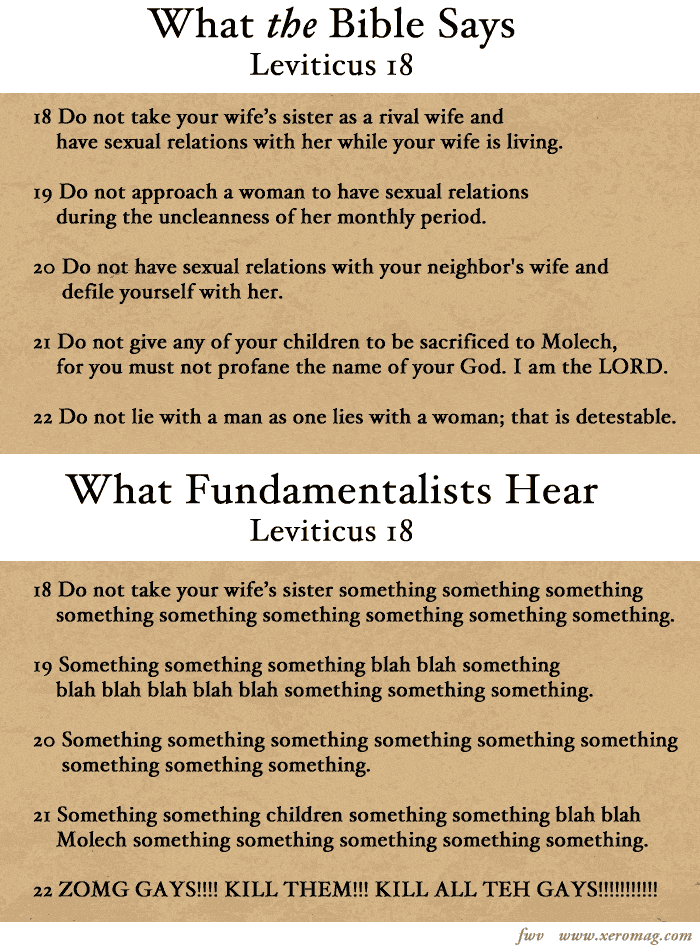For as long as I can remember…even, truth be told, back when I was a kid and still religious–I’ve always had a problem with the Ten Commandments.
People hold them up like they are some sort of amazing moral code that would make the world a better place, if only folks would follow them. And some of them are not bad, really. But honestly? If you set out to make ten rules of conduct that’d make the world a better place, the Ten Commandments really aren’t very good. They read like a hasty and poorly-thought-out first draft, scribbled on the back of a napkin at a greasy all-night diner rather than handed down from the divine lips of a burning bush and carved by an act of supernatural will onto tablets made of stone.
So let’s look at ’em, shall we?
#1: I am the Lord your God. You shall have no other gods before me.
Okay, fine, we get it. The god of Abraham is a jealous god. In fact, the formal name of that god is not “Jehovah” or “Elohim” or “YHVH” but “Jealous,” according to Exodus 34 (“Take heed to thyself, lest thou make a covenant with the inhabitants of the land whither thou goest, lest it be for a snare in the midst of thee: But ye shall destroy their altars, break their images, and cut down their groves: For thou shalt worship no other god: for The Lord, whose name is Jealous, is a jealous God”).
Now, one might argue that this commandment, if it were followed, would make the world a better place, or at least one less fraught with religious warfare; if everyone is following the same god, there’s no religious strife, right?
Well, no. Protestants and Catholics, Catholics and Jews, Protestants and Jews, Protestants and Muslims, Muslims and Jews–they all find plenty of reason to beat one another up even though they nominally have the same god.
And what’s so great about a god who’s insecure, anyway? I’d give this one a miss completely.
#2: Thou shalt not make thee any graven image, or any likeness of any thing that is in heaven above, or that is in the earth beneath, or that is in the waters beneath the earth.
This is the one that everyone gets wrong. The Catholics, who have a rich and proud tradition of idolatry, ruled that this rule applies only to idols, but the language is pretty clear…no likeness of any thing. The original intent was to prohibit ALL representational art–an intent that portions of the Muslim community still follow today.
No representations. Virtually the entire Western world totally ignores this. Lose it. Next:
#3: Thou shalt not take the name of the LORD thy God in vain; for the LORD will not hold him guiltless that taketh his name in vain.
Another one that nobody gets right.
The ancient Israelites had a very deep set of beliefs about the power of a name (why do you think the Genesis story features Adam naming all the animals so prominently? It was a symbolic way of giving Adam power over them.) To “take the name” of someone is to call yourself that thing; if I take the name of my neighbor, it’s identity fraud. Vanity is pride. If I take the name of the Lord in vain, it means to call myself god (or, presumably, an agent thereof) out of pride.
It does not mean to say “goddamnit,” goddamnit.
But even if it did, seriously, there’s a lot more evil done in the world than folks saying “goddamnit.” Wasting ten percent of the entire moral code on this seems quite a waste to me. Lose it. Next:
#4: Remember to honor the Sabbath, and keep it holy.
Except that the Sabbath is…err, Saturday.
But what exactly does this mean? In Atlanta, it means you can’t sell beer on Sunday until the afternoon, because Jesus don’t drink beer ’til twelve o’clock, but that’s about it. Now, I can get behind the notion of having a day that’s reserved for not working, especially in a Bronze Age slave society–hell, everyone needs a day or two off. But again, reserving 10% of a universal moral code for this?
#5: Honor thy father and mother that thy days be long in the land which the Lord gives thee.
No.
Seriously, no. Even as a 5-year-old, I thought this was a terrible rule. Now, as an adult, I think it’s even worse.
Honor and respect are always earned. They are never automatic. I’ve met waaaaaay the fuck too many parents who do not deserve honor–parents who abuse their kids, parents who neglect their kids, parents who rape and sexually violate their kids.
This becomes ESPECIALLY odious when you consider that it’s a one-way street; parents are nowhere commanded to treat their children with respect, and not, y’know, rape and abuse them. Any just system of morals has to apply both ways. It cannot place bounds on the behavior of one group toward another while also tacitly permitting the second group carte blanche with the way they treat the first. This rule is fucked-up and poorly conceived from the get-go. More on it in a bit.
#6: Thou shalt not kill.
I have no problem with this one.
Nobody I know actually takes it as a given; everyone I’ve ever personally met, without exception, carves out exceptions and limitations. Like in self-defense, for instance, or defense of another. Or in war. Or if the other person is gay, or has brown skin. Or if the other person has been convicted of a capital crime, or has brown skin and lives in Texas, which is pretty much the same thing. Or when the spirit of the Lord fills him to plant pipe bombs in women’s clinics, that the Lord may blow people into bloody scraps, in His Divine Mercy.
I think the world might be a better place if people applied fewer exceptions to this rule, actually.
#7: Thou shalt not commit adultery.
Back in the days of the ancient Israelites, only women could commit adultery; if a married man slept with a woman not his wife, that was considered fornication, not adultery. The Ten Commandments were written by–err, handed down by men. They condemn only adultery specifically. Coincidence? I think not.
In any event, I can get behind the notion that it is wrong to betray the trust of a person to whom you have pledged your love. Betraying the trust of another person sucks, and it’s wrong.
But adultery, whether narrowly or widely defined, isn’t always a betrayal of trust. There can be and are people who genuinely don’t mind if their lovers have other lovers. I’m one of them. Any reasonable universal code of morality has to recognize that not everyone is the same, seems to me. More on this one in a bit, too.
#8: Thou shalt not steal.
A good start. I’d like to see language that makes it plain this applies not only to direct theft, like at the point of a gun, but also to any deliberate attempt to defraud, either a person or a group of people, through direct or indirect means (I’m looking at you here, Enron). This can and should explicitly be extended to contract fraud, price-fixing, securities fraud, pension-skimming, Ponzi schemes, bribery, counterfeiting, forgery, license fraud, kickbacks, insurance fraud, investment fraud, and so on, which are all theft in my book, and deserve to be explicitly identified as such.
#9: Thou shalt not bear false witness against thy neighbor.
Thou shalt not bear false witness period. Police officer who lied under oath at zaiah‘s traffic court hearing, I’m especially looking at you.
It’s interesting to me that Biblical morality does not prohibit lying; only bearing false witness, a very narrow and specific type of lying. While I am reluctant to go so far as to outlaw every form of falsehood, I think this rule could be expanded a bit.
And finally:
#10: Thou shalt not covet thy neighbor’s wife. Thou shalt not covet thy neighbor’s house or fields, nor his male or female slaves, nor his ox or ass, or anything that belongs to him.
You know, the notion of thought crime has always smelled a little rancid to me. I can see not stealing one’s neighbor’s goods, but not wanting them? That’s reaching. First, because we don’t really have a good grasp on controlling what we want; I desire an iPhone 4, but I hardly think that makes me a menace to society. Second, because detachment from desire as a general principle leads, I think, to stagnation; sometimes it’s desire that gives us the impetus to accomplish something.
Ixnay.
So out of ten commandments, we have five that I’d lose completely, a couple more that have serious problems, and some fine-tuning on the rest.
Just as important as what the Commandments say is what they DON’T say. For a list of supposedly divinely inspired moral absolutes, they sure do leave a lot of room of some pretty reprehensible stuff.
Like using violence, torture, or threat against another person, say. Or unlawfully depriving other people of what is theirs without actually stealing it…say, by burning down someone’s house. Or depriving other people of their life, property, or dignity on the basis of racism, sexism, xenophobia, and so on. Or engaging in corruption as part of a civic, religious, social, police, or government institution.
Or running forced labor camps like those in North Korea, where people convicted of a crime are punshed “to the third generation.”
Or, y’know, engaging in slavery, that appalling and horrific institution of evil which the Bible nevertheless accepts and condones.
So here’s a Ten Commandments as I might find it more palatable:
#1: Thou shalt not have, keep, or deal in any slaves; nor indentured servants, nor any other kind of unpaid serf; nor shalt thou traffic in human beings as chattel for any purpose.
#2: Thou shalt not deprive any person of the liberties thou claims for thyself, on the basis of that person’s religion, nor race, nor creed, nor ethnicity, nor language, nor sex, nor sexual identity, nor gender identity, nor parentage, nor occupation, nor caste.
#3: Thou shalt not hold the transgresses nor infractions of the law against any individual save for those who committed those transgresses, or caused by act of will the transgresses to be committed; thou shalt not hold the sins of the father against the son, nor of the aunt against the niece.
#4: Thou shalt not use torture, nor threat of torture, in any way for any means, whether to interrogate or to coerce any statement from any person.
#5. Honor thy family, and treat them with respect and compassion, if thou expects respect and compassion in return. Thou shalt not commit any abuses upon those in thy care, nor abuse others, but shall instead seek to treat all persons with the respect and compassion thou feels is thy due; and to acknowledge that we are all family.
#6: Thou shalt not kill, nor justify killing in the name of any god who thou dost worship; for surely any such god does not deserve thy worship. Thou shalt not commit violence upon another. Thou shalt return violence for violence only as a last resort, and only to the extent necessary and no more.
#7: Thou shalt not betray the covenants of thy relationships with thy spouse or spouses, or thy lovers or romantic partners.
#8: Thou shalt not steal, nor deprive of others their possessions or property by any unlawful means, direct or indirect. Thou shalt not extort, nor seek through violence, trickery, coercion, graft, extortion, falsehood, scam, or misrepresentation to obtain that which belongs to another.
#9: Thou shalt not bear false witness against thy neighbor, nor seek through falsehoods or misrepresentation, direct or indirect, to manipulate, control, or coerce other people.
#10: Thou shalt not deprive unlawfully thy neighbor or any other person of his property, his money, or anything else which belongs to him, by taking it for yourself, by destroying it, or by otherwise maliciously preventing him from using it. Thou shalt not poison nor pollute thy neighbor’s land or his fields, or the air he breathes.
Honestly, I think my version is a lot better than the first draft in the Bible.
Like this:
Like Loading...


 Apparently, he’d been riding along the road, just minding his own business and doing whatever it is a despotic monarch does, when some Anarchist threw a hand grenade at him. The grenade totally missed, and did little more than make some noise and frighten the horses. So Alexander, being a despotic monarch who thought he could do whatever the hell he wanted to, stopped the carriage, got out, and started yelling at the Anarchist who had just thrown a grenade at him. Whereupon another Anarchist just happened to wander by, and just happened to have a grenade in his pocket, and it was curtains for the luckless Tsar. Lacy, gently wafting curtains, on windows gilded in gold with a strange half-Greek-god, half-angel, half-tentacle-monster thing embossed over the top, but curtains nonetheless.
Apparently, he’d been riding along the road, just minding his own business and doing whatever it is a despotic monarch does, when some Anarchist threw a hand grenade at him. The grenade totally missed, and did little more than make some noise and frighten the horses. So Alexander, being a despotic monarch who thought he could do whatever the hell he wanted to, stopped the carriage, got out, and started yelling at the Anarchist who had just thrown a grenade at him. Whereupon another Anarchist just happened to wander by, and just happened to have a grenade in his pocket, and it was curtains for the luckless Tsar. Lacy, gently wafting curtains, on windows gilded in gold with a strange half-Greek-god, half-angel, half-tentacle-monster thing embossed over the top, but curtains nonetheless.




 Which is an awesome money-saver, if you think about it. You can’t be forced to comply with inspection results if the facility is never inspected; you don’t have to worry about FDA regulations or compliance with OSHA mandates if the FDA and OSHA don’t know you exist.
Which is an awesome money-saver, if you think about it. You can’t be forced to comply with inspection results if the facility is never inspected; you don’t have to worry about FDA regulations or compliance with OSHA mandates if the FDA and OSHA don’t know you exist.
 Looked at through the lens of treating others the way they want to be treated, there is nothing immoral about, say, oral sex. Or sex with two partners, if all the people involved are on board with that. Or masturbation. These things don’t fit the notion of morality as a framework that prevents people from doing harmful things to one another; they aren’t harmful.
Looked at through the lens of treating others the way they want to be treated, there is nothing immoral about, say, oral sex. Or sex with two partners, if all the people involved are on board with that. Or masturbation. These things don’t fit the notion of morality as a framework that prevents people from doing harmful things to one another; they aren’t harmful.
